医护英语考试 (1)
全国医护英语水平考试
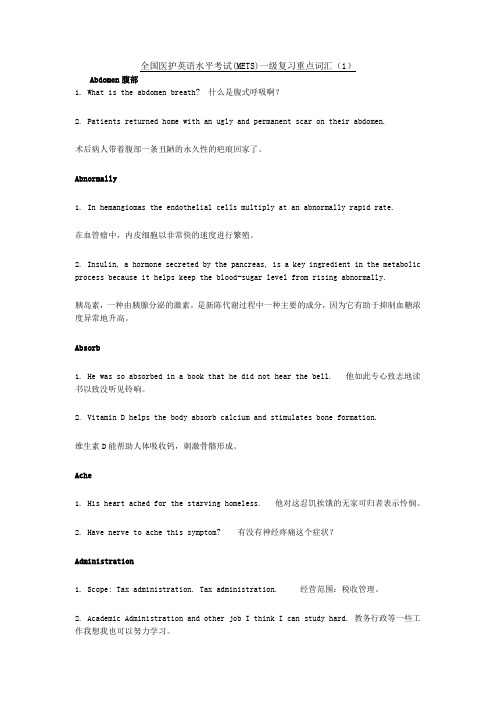
全国医护英语水平考试(METS)一级复习重点词汇(1)Abdomen腹部1. What is the abdomen breath? 什么是腹式呼吸啊?2. Patients returned home with an ugly and permanent scar on their abdomen.术后病人带着腹部一条丑陋的永久性的疤痕回家了。
Abnormally1. In hemangiomas the endothelial cells multiply at an abnormally rapid rate.在血管瘤中,内皮细胞以非常快的速度进行繁殖。
2. Insulin, a hormone secreted by the pancreas, is a key ingredient in the metabolic process because it helps keep the blood-sugar level from rising abnormally.胰岛素,一种由胰腺分泌的激素,是新陈代谢过程中一种主要的成分,因为它有助于抑制血糖浓度异常地升高。
Absorb1. He was so absorbed in a book that he did not hear the bell. 他如此专心致志地读书以致没听见铃响。
2. Vitamin D helps the body absorb calcium and stimulates bone formation.维生素D能帮助人体吸收钙,刺激骨骼形成。
Ache1. His heart ached for the starving homeless. 他对这忍饥挨饿的无家可归者表示怜悯。
2. Have nerve to ache this symptom? 有没有神经疼痛这个症状?Administration1. Scope: Tax administration. Tax administration. 经营范围:税收管理。
医护英语一级考试试题

医护英语一级考试试题一、听力理解(共20分)A. 短对话理解(每题2分,共10分)1. (播放录音) 在医院前台,一位病人询问挂号处在哪里。
A. 住院部B. 挂号处C. 急诊室D. 药房2. (播放录音) 护士正在告知病人服药的时间。
A. 饭前B. 饭后C. 睡前D. 任意时间B. 长对话理解(每题2分,共10分)听一段医生与病人的对话,回答以下问题:3. 病人的主要症状是什么?A. 发热B. 咳嗽C. 头痛D. 胃痛4. 医生建议病人做哪些检查?A. 血液检查B. X光检查C. 超声波检查D. 心电图检查二、词汇与语法(共20分)5. 选择正确的医学术语填空。
(每题2分,共10分)A. 心脏B. 肝脏C. 肾脏D. 脾脏(1)The _______ is one of the vital organs responsible for filtering blood.正确答案:C6. 选择正确的语法形式完成句子。
(每题2分,共10分)(2)The nurse _______ the patient's temperature every four hours.A. checksB. checkedC. will checkD. has checked正确答案:A三、阅读理解(共30分)7. 阅读以下短文,回答问题。
(每题3分,共15分)The role of a nurse is to provide care and support to patients in a medical setting. Nurses work under the supervision of doctors and are responsible for a variety of tasks including monitoring vital signs, administering medication, and assisting with procedures.(1)What is the main role of a nurse?A. To perform surgeriesB. To provide care and support to patientsC. To diagnose diseasesD. To prescribe medication(2)Under whose supervision do nurses typically work?A. PharmacistsB. DoctorsC. ThemselvesD. Medical technicians8. 阅读以下病例报告,回答问题。
医护英语水平考试METsB护理类模拟试题集
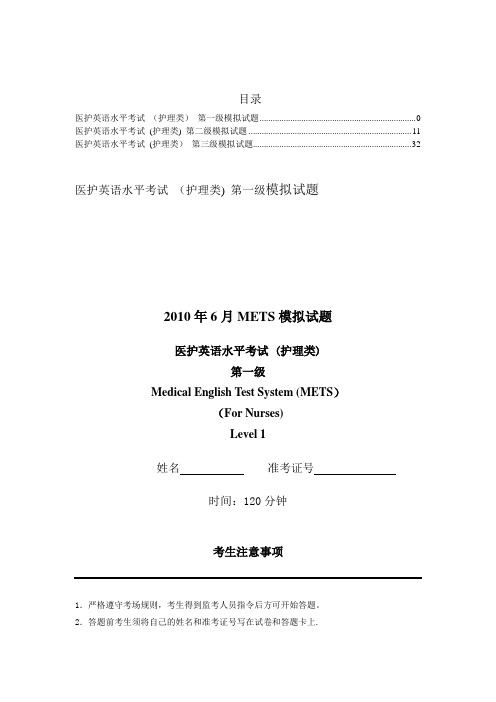
目录医护英语水平考试(护理类)第一级模拟试题 0医护英语水平考试(护理类) 第二级模拟试题 (11)医护英语水平考试(护理类)第三级模拟试题 (32)医护英语水平考试(护理类) 第一级模拟试题2010年6月METS模拟试题医护英语水平考试 (护理类)第一级Medical English Test System (METS)(For Nurses)Level 1姓名准考证号时间:120分钟考生注意事项1.严格遵守考场规则,考生得到监考人员指令后方可开始答题。
2.答题前考生须将自己的姓名和准考证号写在试卷和答题卡上.3.答客观题时,一律用2B铅笔,按照答题卡上的要求答题。
如要改动答案,必须用橡皮擦干净。
4.答翻译与写作题时,必须用黑色签字笔在答题卡上答题。
5.注意字迹清楚,保持卷面整洁。
6.考试结束时将试卷和答题卡放在桌上,不得带走。
待监考人员收毕清点后,方可离场。
=================================================== ※未经批准,本试卷任何单位或个人不得保留、复制和出版,违者必究。
医护英语水平考试办公室第一部分听力理解(20%)(20分钟)第一节选择填空在本节中,你将听到10个句子,每个句子后有三个选项,根据你所听到的录音,从试卷中所给的[A]、[B]、[C]三个选项中选出正确答案填入句子空白处,并在答题卡上将相应字母涂黑。
每个句子读两遍。
例如,你将听到以下内容:I've got an awful pain in my belly.请看选项:I've got an awful pain in my ______。
[A]joints [B]armpit [C]belly根据你所听到的录音,答案应选[C]项。
[A][B] [C]下面请听这些句子1。
I’ll take some blood from your _________。
[A] eye[B] ear[C] hair2。
医护英语考试试题及答案
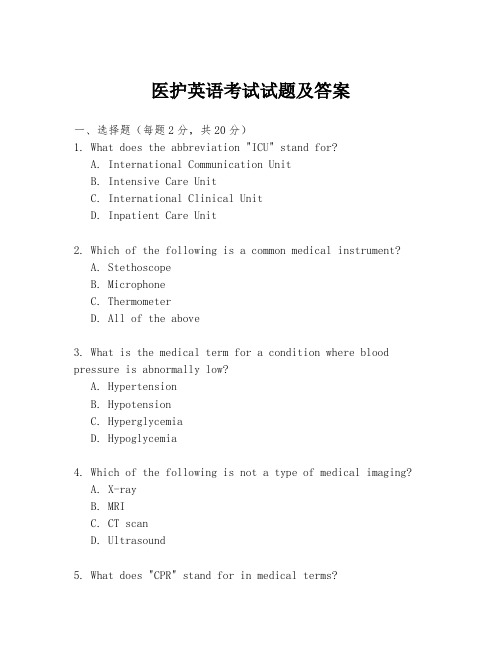
医护英语考试试题及答案一、选择题(每题2分,共20分)1. What does the abbreviation "ICU" stand for?A. International Communication UnitB. Intensive Care UnitC. International Clinical UnitD. Inpatient Care Unit2. Which of the following is a common medical instrument?A. StethoscopeB. MicrophoneC. ThermometerD. All of the above3. What is the medical term for a condition where blood pressure is abnormally low?A. HypertensionB. HypotensionC. HyperglycemiaD. Hypoglycemia4. Which of the following is not a type of medical imaging?A. X-rayB. MRIC. CT scanD. Ultrasound5. What does "CPR" stand for in medical terms?A. Cardiopulmonary ResuscitationB. Chronic Pain ReliefC. Clinical Pathology ReportD. Continuous Positive Respiration6. What is the meaning of the term "anemia"?A. A condition characterized by high levels of red blood cellsB. A condition characterized by low levels of red blood cellsC. A condition characterized by high levels of white blood cellsD. A condition characterized by low levels of white blood cells7. Which of the following is a measure to prevent infectionin a hospital setting?A. Hand hygieneB. Smoking indoorsC. Sharing needlesD. None of the above8. What is the medical term for a surgical procedure to remove a tumor?A. AmputationB. AppendectomyC. ExcisionD. Incision9. Which of the following is a common symptom of the flu?A. Dry coughB. InsomniaC. HyperactivityD. Loss of appetite10. What does "HIV" stand for?A. Hepatitis Infection VirusB. Human Immunodeficiency VirusC. High Intensity VirusD. Hormone Infection Virus二、填空题(每题1分,共10分)11. A healthcare professional who specializes in surgery is called a _______.12. The process of cleaning a wound is known as _______.13. The abbreviation "BP" is commonly used to refer to_______.14. A person with a medical condition that requires ongoing treatment is referred to as a _______.15. The medical term for a broken bone is _______.16. The first step in treating a burn is to _______ the area.17. The abbreviation "OT" stands for _______.18. Aspirin is often used as an _______ for pain relief.19. The medical term for a severe allergic reaction is_______.20. The abbreviation "A&E" refers to the _______ departmentin a hospital.三、简答题(每题5分,共30分)21. Explain the purpose of a blood transfusion.22. Describe the role of a nurse in a hospital setting.23. What are the signs of a heart attack?24. Discuss the importance of patient confidentiality in healthcare.四、阅读理解(每题5分,共20分)阅读以下短文,回答下列问题。
医护英语考试题及答案
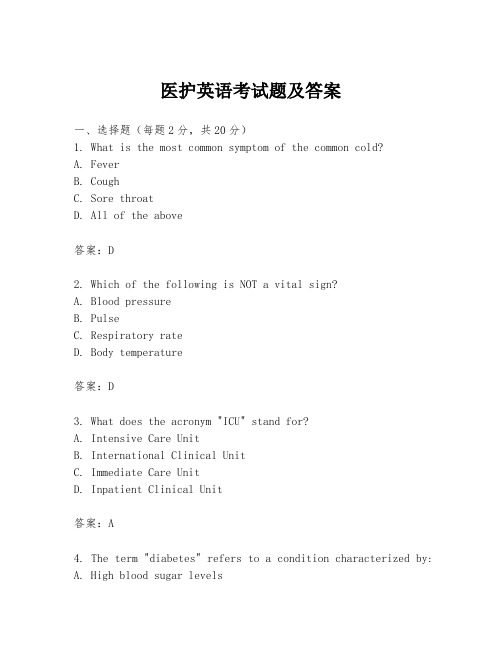
医护英语考试题及答案一、选择题(每题2分,共20分)1. What is the most common symptom of the common cold?A. FeverB. CoughC. Sore throatD. All of the above答案:D2. Which of the following is NOT a vital sign?A. Blood pressureB. PulseC. Respiratory rateD. Body temperature答案:D3. What does the acronym "ICU" stand for?A. Intensive Care UnitB. International Clinical UnitC. Immediate Care UnitD. Inpatient Clinical Unit答案:A4. The term "diabetes" refers to a condition characterized by:A. High blood sugar levelsB. Low blood sugar levelsC. High blood pressureD. High cholesterol levels答案:A5. A patient is said to be "anemic" if they have:A. Too much red blood cellsB. Too few red blood cellsC. Too much white blood cellsD. Too few platelets答案:B6. What is the medical term for a surgical incision?A. IncisionB. AmputationC. BiopsyD. Excision答案:A7. Which of the following is a method of sterilization?A. Washing with soap and waterB. BoilingC. Using alcohol swabsD. All of the above答案:D8. The abbreviation "MRI" stands for:A. Magnetic Resonance ImagingB. Medical Radioactive ImagingC. Multiple Radioactive IndicatorsD. Medical Radio Imaging答案:A9. What is the primary function of the liver?A. To filter bloodB. To produce bileC. To regulate blood sugar levelsD. To produce red blood cells答案:B10. A "thermometer" is used to measure:A. Blood pressureB. Body temperatureC. Respiratory rateD. Pulse答案:B二、填空题(每题1分,共10分)11. The medical term for a broken bone is ____________.答案:fracture12. A person with a severe allergy to penicillin would be given a warning to avoid contact with this medication, known as a(n) ____________.答案:allergy alert13. The abbreviation "HIV" stands for Human Immunodeficiency ____________.答案:Virus14. A healthcare professional who specializes in the diagnosis and treatment of diseases of the heart is called a ____________.答案:cardiologist15. The process of removing waste products from the body is known as ____________.答案:excretion16. A patient's medical history is recorded in their____________.答案:medical record17. The practice of washing hands with soap and water to prevent the spread of disease is called ____________.答案:hand hygiene18. A(n) ____________ is a healthcare professional trained to provide emergency medical services.答案:paramedic19. The abbreviation "OT" stands for Occupational____________.答案:Therapy20. A patient's condition is assessed and monitored throughregular ____________.答案:check-ups三、简答题(每题5分,共30分)21. What are the four stages of the nursing process?答案:The four stages of the nursing process are assessment, planning, implementation, and evaluation.22. Explain the difference between a virus and a bacterium.答案:A virus is a microscopic infectious agent that can only replicate inside the living cells of an organism, while a bacterium is a single-celled microorganism that can exist independently and can be beneficial, neutral, or harmful to humans.23. What is the purpose of a stethoscope in medical practice?答案:A stethoscope is used by healthcare professionals to listen to the sounds produced by the body, such as the heartbeat and breathing, to diagnose or monitor various conditions.24. Describe the role of a registered nurse in a hospital setting.答案:A registered nurse in a hospital setting providesdirect patient care, administers medications, monitors patients' conditions, collaborates with physicians and other healthcare professionals, and educates patients about theirhealth conditions and treatments.四、翻译题(每题5分,共20分)25. 请将以下句子翻译成英文:医生建议他每天服用阿司匹林以预防心脏病。
医护英语试卷考卷
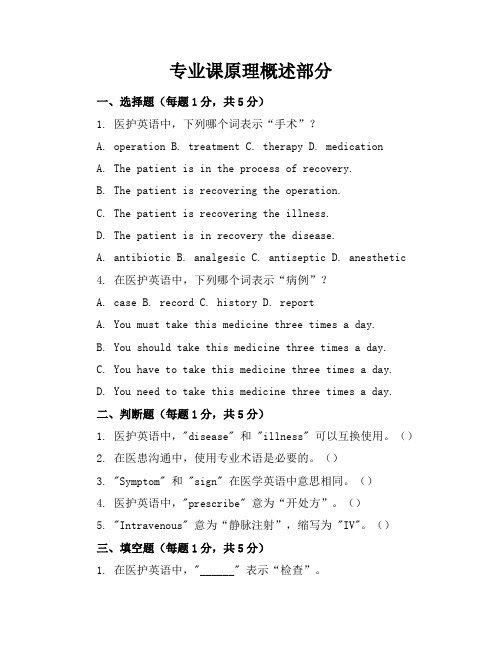
专业课原理概述部分一、选择题(每题1分,共5分)1. 医护英语中,下列哪个词表示“手术”?A. operationB. treatmentC. therapyD. medicationA. The patient is in the process of recovery.B. The patient is recovering the operation.C. The patient is recovering the illness.D. The patient is in recovery the disease.A. antibioticB. analgesicC. antisepticD. anesthetic4. 在医护英语中,下列哪个词表示“病例”?A. caseB. recordC. historyD. reportA. You must take this medicine three times a day.B. You should take this medicine three times a day.C. You have to take this medicine three times a day.D. You need to take this medicine three times a day.二、判断题(每题1分,共5分)1. 医护英语中,"disease" 和 "illness" 可以互换使用。
()2. 在医患沟通中,使用专业术语是必要的。
()3. "Symptom" 和 "sign" 在医学英语中意思相同。
()4. 医护英语中,"prescribe" 意为“开处方”。
()5. "Intravenous" 意为“静脉注射”,缩写为 "IV"。
医护人员试题及答案英语
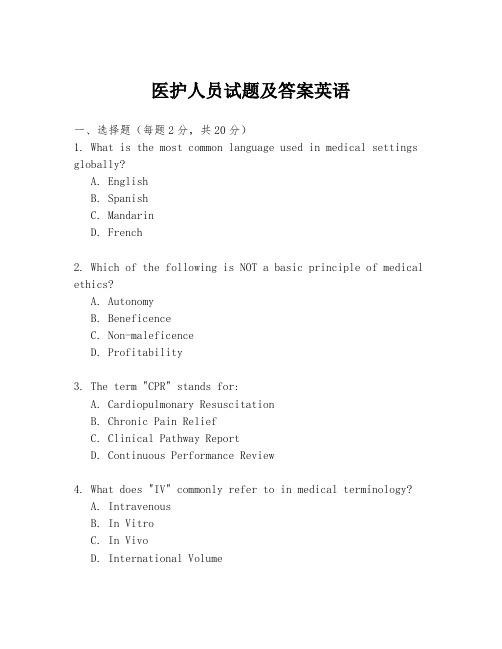
医护人员试题及答案英语一、选择题(每题2分,共20分)1. What is the most common language used in medical settings globally?A. EnglishB. SpanishC. MandarinD. French2. Which of the following is NOT a basic principle of medical ethics?A. AutonomyB. BeneficenceC. Non-maleficenceD. Profitability3. The term "CPR" stands for:A. Cardiopulmonary ResuscitationB. Chronic Pain ReliefC. Clinical Pathway ReportD. Continuous Performance Review4. What does "IV" commonly refer to in medical terminology?A. IntravenousB. In VitroC. In VivoD. International Volume5. The abbreviation "A&E" in a hospital context usually stands for:A. Accounts and ExpensesB. Administration and EducationC. Accident and EmergencyD. Anesthesia and Euthanasia6. Which of the following is a standard precaution to prevent the spread of infections in a healthcare setting?A. Hand hygieneB. SmokingC. Sharing needlesD. Overcrowding7. The "5 Rights" of medication administration are crucial to ensure patient safety. Which of the following is NOT one of the "5 Rights"?A. Right patientB. Right medicationC. Right doseD. Right documentation8. In medical terms, "NPO" stands for:A. No Pain ObservedB. Nothing by mouthC. Not Per OralD. No Personal Objects9. A "prn" order in medication administration means:A. As neededB. Before mealsC. After mealsD. Before and after meals10. The "Universal Precautions" in healthcare are designed to prevent the transmission of:A. Only airborne diseasesB. Only bloodborne pathogensC. All infectious agentsD. Only bacterial infections答案:1. A2. D3. A4. A5. C6. A7. D8. B9. A10. C二、填空题(每空1分,共10分)1. The medical term for a surgical incision into the chest wall is __________.(thoracotomy)2. The abbreviation "BP" commonly refers to __________.(blood pressure)3. The "ABCs" of first aid are Airway, Breathing, and__________.(Circulation)4. A healthcare professional who specializes in the diagnosis and treatment of diseases of the heart is called a __________. (cardiologist)5. The term "telemedicine" refers to the use of __________ to provide medical services remotely.(telecommunications technology)6. The medical procedure where a small amount of skin is removed for examination under a microscope is known as a__________.(biopsy)7. The abbreviation "MRI" stands for Magnetic Resonance__________.(Imaging)8. A "stat" order in a medical setting means the order is tobe done __________.(immediately)9. The "chain of infection" consists of the agent, portal of entry, host, and __________.(exit or portal of exit)10. The abbreviation "HIV" stands for Human __________ Virus. (Immunodeficiency)三、简答题(每题5分,共20分)1. What is the purpose of aseptic technique in healthcare?- The purpose of aseptic technique in healthcare is to prevent contamination and infection by minimizing thepresence of microorganisms in the environment and on the patient's body.2. Explain the difference between a "clean" wound and a "contaminated" wound.- A "clean" wound is one that has been caused by a sterile procedure and is not contaminated by foreign material or bacteria. A "contaminated" wound, on the other hand, is one that has been exposed to bacteria or foreign material, increasing the risk of infection.3. What are the steps involved in the process of wound healing?- The steps involved in wound healing include hemostasis, inflammation, proliferation, and remodeling.4. Describe the role of a nurse in a healthcare team.- The role of a nurse in a healthcare team includespatient assessment, care planning, administration of medications, patient education, and collaboration with other healthcare professionals to ensure comprehensive patient care.四、案例分析题(每题10分,共20分)1. A patient is admitted to the emergency department with severe abdominal pain. The nurse on duty。
医护英语水平考试(护理类)考试大纲介绍
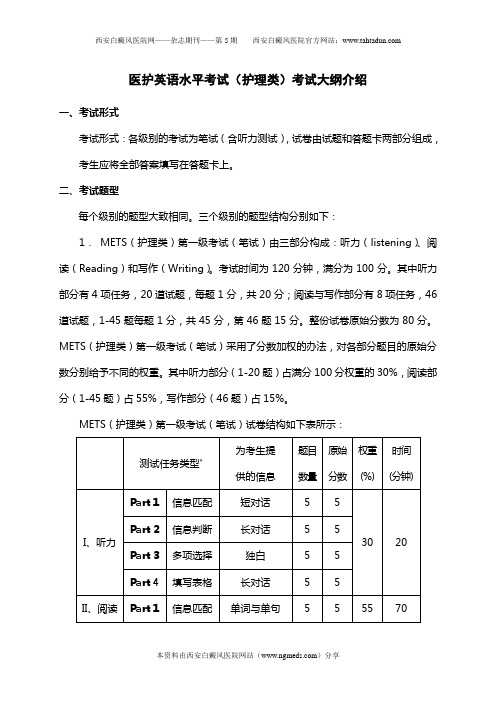
医护英语水平考试(护理类)考试大纲介绍一、考试形式考试形式:各级别的考试为笔试(含听力测试),试卷由试题和答题卡两部分组成,考生应将全部答案填写在答题卡上。
二、考试题型每个级别的题型大致相同。
三个级别的题型结构分别如下:1. METS(护理类)第一级考试(笔试)由三部分构成:听力(listening)、阅读(Reading)和写作(Writing)。
考试时间为120分钟,满分为100分。
其中听力部分有4项任务,20道试题,每题1分,共20分;阅读与写作部分有8项任务,46道试题,1-45题每题1分,共45分,第46题15分。
整份试卷原始分数为80分。
METS(护理类)第一级考试(笔试)采用了分数加权的办法,对各部分题目的原始分数分别给予不同的权重。
其中听力部分(1-20题)占满分100分权重的30%,阅读部分(1-45题)占55%,写作部分(46题)占15%。
METS(护理类)第一级考试(笔试)试卷结构如下表所示:测试任务类型*为考生提供的信息题目数量原始分数权重(%)时间(分钟)I、听力Part 1信息匹配短对话 5 530 20 Part 2信息判断长对话 5 5Part 3多项选择独白 5 5Part 4填写表格长对话 5 5II、阅读与写作Part 1信息匹配单词与单句 5 555 70 Part 2信息匹配单句与告示 5 5Part 3 信息匹配单句与图表 5 5Part 4 补全对话长对话与单句 5 5Part 5 多项选择单句7 7Part 6 信息判断短文8 8Part 7 完形填空短文10 10Part 8短文写作表格 1 15 15 30总计65+1 80 100 120 *实际考试中卷中可能会出现新任务类型2. METS(护理类)第二级考试(笔试)由三部分构成:听力(listening)、阅读(Reading)和写作(Writing)。
考试时间为120分钟,满分为100分。
- 1、下载文档前请自行甄别文档内容的完整性,平台不提供额外的编辑、内容补充、找答案等附加服务。
- 2、"仅部分预览"的文档,不可在线预览部分如存在完整性等问题,可反馈申请退款(可完整预览的文档不适用该条件!)。
- 3、如文档侵犯您的权益,请联系客服反馈,我们会尽快为您处理(人工客服工作时间:9:00-18:30)。
医护英语考试英语问诊常用句子Hello, may (can) I help you? 您好,我可以帮您吗, What seems to be bothering you? 您觉得哪儿不舒服,Do you have a record? 您有病历吗,I`ll transfer you to the surgery department. 我给您转到外科去 what`s wrong with you? 您怎么了,Sit down, please. 请坐。
When did the symptom begin? 症状是什么时候开始的, Have you had any chills (chest pain)? 您有发冷(胸痛)吗, Have you ever coughed up blood? 您咳血过吗,All right. Let me examine you. Would you mind taking off your coat? 好吧。
我给您检查一下,您不介意脱掉外衣吧,Take a deep breath, please. 请深呼吸I`ll take a white blood count and give you an x-ray examination. 我将给您做白细胞计数和胸片检查I`m sure it`s pneumonia. You should be admitted to the hospital.我可以确定您得了肺炎,应当住院。
How long have you been like this? 这种症状有多久了, When did you begin to notice these symptoms? 您什么时候发现这些症状的, What`s your trouble? 你怎么啦,What`s the trouble with you? 你哪儿不舒服,What`s troubling you? 你哪儿不舒服,What`s bothering you? 你哪儿不舒服,What`s up with you? 你生什么病了,What`s the matter with you? 你哪儿不舒服,Is there a sense of distension and numbness? 你有胀和麻木的感觉吗, When did the trouble start? 什么时候开始不舒服,When did the pain start? 什么时候开始痛的,When did it happen? 什么时候发生的,When did your diarrhea start? 你什么时候开始腹泻的, What kind of pain do you feel? 你觉得怎么个痛法,What kind of stool did you notice, watery or mucous? 你注意大便的样子了吗,是水样的还是粘液样,What did you vomit, food or blood? 你吐的是什么,食物还是血, What kind of treatment have you had? 你过去用什么方法治疗过, What about your heart? 你的心脏怎么样,What`s your stool like? 大便是什么样子,Where is your pain? 你觉得哪儿痛,Where does it hurt? 哪儿痛,What`s your appetite? 你的胃口怎么样,How`s your appetite those days? 近来食欲怎么样,How long have you been feeling like this? 你有这样感觉多长时间了, Have you been coughing and sneezing? 你是不是一直咳嗽和打喷嚏, Have you got a high fever? 你发烧吗,Any fever? 发烧吗,Have you got any chronic disease before? 你以前有过慢性病吗, Does it bleed often? 常出血吗,Do you feel short of breath? 你觉得气急吗,Do you feel pain after meals? 是饭后痛吗,Do you feel abdominal pain when you go to the toilet? 你去厕所时感到腹痛吗, Do you have a pain in your stomach? 你肚子痛吗,Do you have a cough? 你咳嗽吗,Do you remember how many times you went to the toilet? 你记得去过多少次厕所吗, Did you receive any treatment before you came to the hospital? 来医院前你接受过治疗吗, I`d like to listen to your chest.我想听听你的胸部。
I`d like to run a few tests.我想给你做些检查。
You must have a blood (sputum) test. 你需要验验血(痰)。
You have the flu.你得了流行感冒。
You have got enteritis.你得了肠炎。
You have caught a chill.你着凉了。
You seem to have picked up some sort of infection.你好象染上什么传染病了。
When did you first notice it你什么时候感觉到的,What kind of pain is it怎样疼,Did you run any temperature你发过烧吗,Have you seen anybody about it你找医生看过吗,I think you need some examinations first.我想您首先需要做一些检查。
You`d better take an X-ray picture to see if there is a fracture.你最好拍张X片子,看看有没有骨折。
I`d like to give you an X-ray.我想给你透视一下。
The X-ray reveals a dislocation of your elbow. X光片显示你的肘关节脱位。
I`ll give you some medicine.我给您开点药。
I`m afraid you have to receive an amputation.恐怕你需要截肢。
It is the only way to save your life.这是挽救您生命的唯一办法。
My diagnosis is that you have a malignant tumor osteogenic sarcoma.我的诊断是您得了恶性骨肉瘤。
The fractured leg must be kept in plaster.必须把骨折的腿打上石膏。
Open your mouth, please. 请张开嘴。
It`s too worn out to be filled. 这颗牙坏得太历害了,无法补了。
Have you ever had an injection of procaine(penicillin)before? 你以前打过普鲁卡因(青霉素)吗,Does it hurt when you eat anything sweet or sour? 你吃甜的或酸的东西时疼吗, I`ll be cleaning them now. Let me know if it hurts.我现在给你洗牙,疼就说一声。
The wound hasn`t healed enough yet.伤口还没完全愈合。
You`ll have to wait for one more month, or they won`t fit properly.你得再等一个月,要不然装上也不会合适。
What kind of material do you prefer你想要什么材料的,Would you like to have a look at some of the samples? 你要看一看样品吗,You`ve got to come five times before the work can be finished.你得来五次才能做好。
Shall I fix you a plastic crown? 我给你装一个塑料牙套好吗, We`ll give you an X-ray to find out the condition of the root.我们要给你拍一张X光片,看看牙根的情况。
You`ll have to leave your old denture here. 你得把原先的假牙留下。
You should leave your denture in your mouth all day. 你应该整天戴着你的假牙。
How are your periods? Are they heavy? 你的月经怎么样,量多吗, Have you had any pain in this area during your menstruation? 你来月经时间时这一部位疼吗,How about your menstruation cycles? 你的经期准吗,Have you had any discomfort? 有什么不舒服吗,When was your last menstruation? 你上一次月经是什么时候,How long is your period usually? 通常你的月经周期多长,Have you had any bleeding, watery discharge or pain in your lower abdomen? 你有过阴道出血、水性分泌物以及下腹部疼痛的情况吗, How long has this been bothering you? 这种不适感有多久了,Did you feel contractions regularly? 你感觉到过有规律的宫缩吗,What`s the amount of bleeding? Is it profuse? 出血量多少,很多吗, Doyou mind if I examine you briefly? 我简单地给你检查一下,你介意吗, I`ll run some tests on you.我要给你做些化验。
